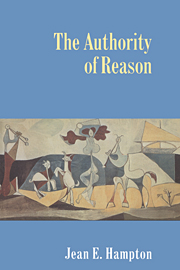Book contents
- Frontmatter
- Contents
- Editor's Preface
- Preface and Acknowledgments
- Introduction
- PART I SCIENCE AND OBJECTIVE NORMS
- PART II INSTRUMENTAL REASON
- 4 Instrumental Reasons
- 5 Why Instrumental Reasoning Isn't Instrumental
- 6 Instrumental Reasoning and the Methodology of Science
- PART III REASONS AND REASONING
- Bibliography
- Index
4 - Instrumental Reasons
Published online by Cambridge University Press: 02 December 2009
- Frontmatter
- Contents
- Editor's Preface
- Preface and Acknowledgments
- Introduction
- PART I SCIENCE AND OBJECTIVE NORMS
- PART II INSTRUMENTAL REASON
- 4 Instrumental Reasons
- 5 Why Instrumental Reasoning Isn't Instrumental
- 6 Instrumental Reasoning and the Methodology of Science
- PART III REASONS AND REASONING
- Bibliography
- Index
Summary
Many philosophers and social scientists argue that the only acceptable theory of the nature of practical reason is what is called the “instrumental” theory, which says, roughly, that reason's only practical role is working out and recommending action that best achieves the end of the agent. Such theorists dismiss the idea that reason could ever play a noninstrumental role by dictating or determining ends themselves.
There are two general reasons why philosophers have been troubled by the noninstrumental view. First, it is a conception of reason that seems unacceptable from the standpoint of science. What special “sight” or access to normative reality can we realistically ascribe to human reason, such that it can tell us our ends in life? And how does a scientific worldview permit us to believe that there are unmotivated ends that we are rationally compelled to pursue? Science, after all, does not recognize such objects or properties with inherent prescriptive power. As we noted in Chapter 1, J. L. Mackie calls such objects and properties “queer” – indeed, too queer, given the strictures of science, for us to believe that they obtain. Moreover, no scientific description of human beings has identified a rational capacity within us that can discover these objects.
- Type
- Chapter
- Information
- The Authority of Reason , pp. 125 - 166Publisher: Cambridge University PressPrint publication year: 1998



